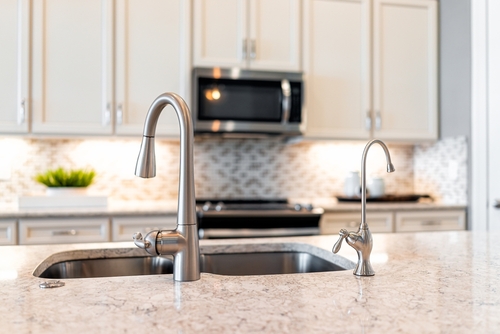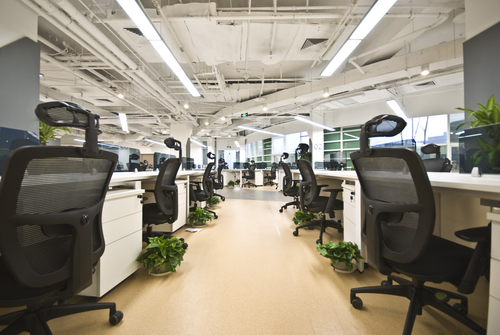
Benefits of Regular Office Chair Cleaning
September 11, 2023
Cleaning and Polishing Granite Countertops
November 4, 2023Keeping Your Restaurant Spotless: Commercial Kitchen Cleaning
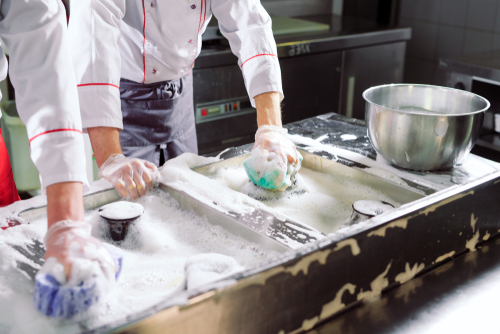
Keeping Your Restaurant Spotless Commercial Kitchen Cleaning
Keeping Your Restaurant Spotless – Commercial Kitchen Cleaning. In the competitive world of the food industry, cleanliness is not just a matter of aesthetics; it’s a crucial factor that can make or break your restaurant’s reputation.
This article will delve into the importance of maintaining impeccable cleanliness in your commercial kitchen and how it directly impacts customer satisfaction and health. Read on!
The Significance of Commercial Kitchen Cleaning
Commercial kitchens face distinctive challenges when it comes to cleanliness.
The high volume of food preparation, constant traffic, and various kitchen equipment create a breeding ground for dirt and grime. These challenges demand a proactive approach to cleaning.
Legal and Safety Implications
Beyond aesthetics, a clean kitchen is legally mandated in Singapore. Non-compliance can result in hefty fines and potential closure of your establishment.
Moreover, it’s a matter of safety – cleanliness reduces the risk of foodborne illnesses, which can be detrimental to both customers and your business.
Health and Hygiene Standards
Singapore has stringent regulations and guidelines for commercial kitchen cleanliness. These standards are in place to ensure that the food served is safe for consumption.
Non-compliance can lead to severe consequences, so it’s imperative to adhere to these standards meticulously.
Daily Cleaning Procedures

Checklist for Daily Kitchen Cleaning
Maintaining cleanliness isn’t a one-time task but an ongoing commitment. A daily cleaning routine is essential to prevent the accumulation of dirt and bacteria.
Here’s a comprehensive checklist to guide you through your daily cleaning procedures:
- Sanitizing Surfaces: Countertops, cutting boards, and all food preparation surfaces should be thoroughly sanitized before and after each use.
- Dishwashing: Properly clean and sanitize all dishes, utensils, and kitchen equipment.
- Floor Cleaning: Sweeping and mopping the kitchen floor is essential to remove debris and spills.
- Trash Management: Empty trash bins regularly to prevent odors and pests.
- Appliance Cleaning: Wipe down appliances, ovens, and stovetops to remove grease and food residue.
Importance of During-and-After Service Cleaning
During busy service hours, it’s crucial to maintain cleanliness continuously. Assign specific staff members to oversee cleanliness and ensure that spills are promptly cleaned to prevent slips and accidents.
Cleaning Equipment and Supplies
Essential Tools and Products
Choosing the right cleaning supplies is pivotal for effective kitchen cleaning. Some essential tools and products include:
- Degreasers: To remove tough grease stains.
- Sanitizers: For disinfecting surfaces.
- Microfiber Cloths: Ideal for wiping and dusting.
- Mop and Bucket: For floor cleaning.
- Sponges and Scrubbers: To tackle stubborn stains.
- Gloves and Aprons: To protect staff during cleaning.
Staff Training and Responsibilities
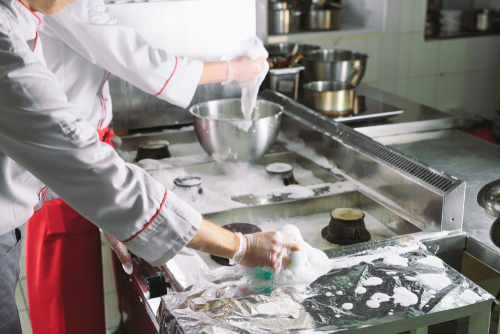
Proper Training
Your kitchen staff must be trained in proper cleaning techniques. This includes understanding the use of cleaning agents, safety protocols, and the importance of maintaining cleanliness in their daily routines.
Clear Roles and Responsibilities
Assign specific roles and responsibilities to your staff members. This ensures that everyone knows what is expected of them regarding cleanliness.
For example, designate someone to be in charge of dishwashing, another for surface cleaning, and so on.
Preventing Cross-Contamination
Understanding the Risks
Cross-contamination can lead to foodborne illnesses, which can be catastrophic for your restaurant.
Educate your staff about the risks associated with cross-contamination and enforce strict protocols to prevent it.
Best Practices
Implement best practices such as using color-coded cutting boards, separate storage for raw and cooked foods, and proper handwashing techniques to minimize the risk of cross-contamination.
Deep Cleaning Procedures
Frequency of Deep Cleaning
Deep cleaning should be conducted regularly, but the frequency depends on the intensity of your kitchen’s operations. For most restaurants, a monthly deep cleaning is recommended.
Step-by-Step Guide
Here’s a step-by-step guide to conducting a thorough deep cleaning of your commercial kitchen:
- Clear the Area: Remove all equipment and appliances from the workspace.
- Degrease Surfaces: Use a powerful degreaser to clean countertops, walls, and equipment.
- Clean Appliances: Take apart and clean ovens, stovetops, and refrigerators.
- Floor and Ventilation: Scrub the floor and clean the ventilation systems.
- Inspect and Replace: Inspect equipment for wear and tear, and replace damaged parts.
Maintaining Kitchen Appliances
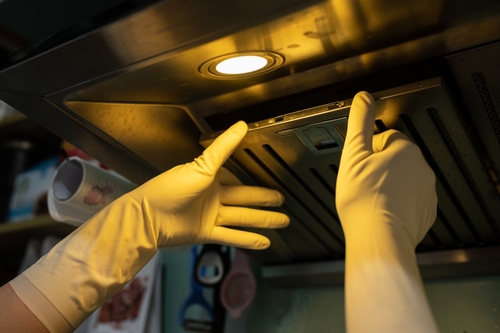
Extending Equipment Lifespan
Proper kitchen equipment cleaning ensures food safety and extends the lifespan of your appliances. Regular maintenance prevents breakdowns and costly repairs.
Common Mistakes to Avoid
Avoid common mistakes like using abrasive cleaners on stainless steel, neglecting to clean appliance interiors, or using excessive water that could damage electrical components.
Managing Waste and Disposal
Proper Waste Disposal
Correct disposal of kitchen waste is vital for both hygiene and environmental reasons. Implement a waste management system that includes recycling and composting where possible.
Reducing Environmental Impact
Minimize your restaurant’s environmental impact by reducing food waste, using eco-friendly packaging, and participating in local recycling programs.
Pest Control Measures
Identifying Pests
Common pests in commercial kitchens include rodents, cockroaches, and flies. Regular inspections can help identify and address pest infestations promptly.
Preventive Strategies
Prevention is key to pest control. Maintain a clean kitchen, seal entry points, and consider professional pest control services as a proactive measure.
Monitoring and Quality Control
Regular Inspections
Implement a system of regular inspections and audits to ensure that cleanliness standards are consistently met. Correct any issues promptly to maintain a spotless kitchen.
Cost-Effective Cleaning Solutions
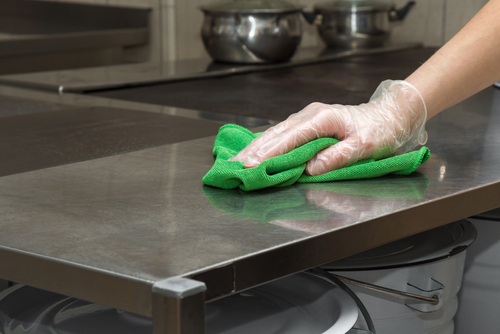
Managing Cleaning Costs
While cleanliness is non-negotiable, you can manage cleaning costs by optimizing cleaning schedules, bulk purchasing of supplies, and staff training to minimize wastage.
Cost-Benefit Analysis
Consider the cost-benefit of professional cleaning services. Sometimes, outsourcing certain cleaning tasks can be more cost-effective than handling them in-house.
Frequently Asked Questions (FAQs)
What are the legal requirements for kitchen cleanliness in Singapore?
Singapore mandates strict cleanliness standards for commercial kitchens to ensure food safety. Non-compliance can lead to fines, closure, or legal action.
How often should deep cleaning be conducted?
The frequency of deep cleaning depends on the kitchen’s activity level. For most, a monthly deep cleaning is recommended.
Can I outsource kitchen cleaning services?
Yes, outsourcing cleaning services can be a cost-effective solution. Ensure that the service provider complies with local regulations.
What are the consequences of failing health inspections?
Failing health inspections can result in fines, temporary closure, or even permanent restaurant shutdown.
How do I handle a pest infestation in my kitchen?
Address pest infestations promptly by contacting a professional pest control service. Implement preventive measures to avoid future infestations.
Is it necessary to hire professional cleaners?
While you can manage cleaning in-house, professional cleaners bring expertise and specialized equipment, often ensuring a higher level of cleanliness.
Keeping Your Restaurant Spotless: Commercial Kitchen Cleaning – Conclusion
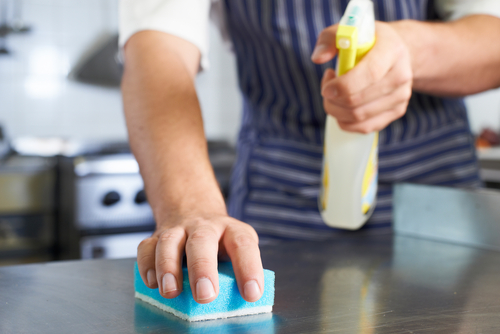
In conclusion, maintaining a spotless commercial kitchen is not just a matter of compliance; it’s a vital aspect of running a successful restaurant.
By adhering to Singapore’s stringent cleanliness standards, implementing rigorous cleaning routines, and investing in staff training, you’ll meet legal requirements and ensure your customers’ health and satisfaction.
Prioritizing cleanliness is the key to the long-term success of your restaurant.
Are you seeking professional and reliable cleaning services in Singapore? Contact us today!


